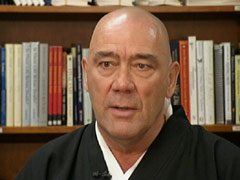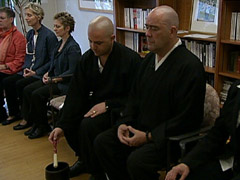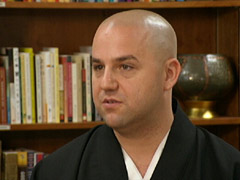In This Episode << SLIDE LEFT TO SEE ADDITIONAL SEGMENTS
Zen Hospital Chaplains
ROB BUNDY (Buddhist Chaplain Trainee, speaking to patient): Instead of pushing that pain away, just let it be. You are not the pain. That pain is something that doesn’t have to be who you are. Just let your breath take that pain away from you. Beautiful.
BETTY ROLLIN, correspondent: Rob Bundy is one of 24 Buddhist chaplains-in-training at Beth Israel Medical Center in New York.
BUNDY: Just breathe down into that pain.
ROLLIN: Audrey Alasia has multiple diseases of the spinal cord and is in constant pain. Rob uses the Buddhist techniques of meditation, visualization, and a focus on breathing to help ease Audrey’s suffering.
BUNDY: The pain comes and goes, right?
AUDREY ALASIA: Yes.
 ROBERT CHODO JUSSEI CAMPBELL: In our practice as contemplatives, as Buddhists, as many other contemplatives do, it’s to come back to the moment. What’s happening right now? Come back to your breath. Can you breathe right now? Everything else is going on, but can you come back to the breath? Can we slow it down a little? Can we start to relax?
ROBERT CHODO JUSSEI CAMPBELL: In our practice as contemplatives, as Buddhists, as many other contemplatives do, it’s to come back to the moment. What’s happening right now? Come back to your breath. Can you breathe right now? Everything else is going on, but can you come back to the breath? Can we slow it down a little? Can we start to relax?
KOSHIN PALEY ELLISON: I think one of the most important things you can do for someone is to hear their pain and how miserable they are.
CHODO CAMPBELL: Rather than “You’re going to be fine, Mom. You will be home in a couple of days, the operation was a success, bought some flowers, you know, you are going to be great. You will be back on your feet again soon.” That’s not addressing what’s happening to me right now.
ROLLIN: Chodo Campbell and Koshin Ellison, both Buddhist monks, are co-founders and directors of the New York Zen Center for Contemplative Care, which runs Beth Israel’s Buddhist chaplaincy program, the only accredited clinical program of its kind. Chodo and Koshin minister to patients themselves and train others, who are both Buddhists and non-Buddhists. Chaplains may also provide their special kind of care to patients’ families and staff. Part of the chaplain’s training consists of learning about other faith traditions. Sister Maureen Mitchell is there to answer questions about Catholicism.
BUNDY (speaking during training seminar): Is it inappropriate for me as a Buddhist to make the sign of the cross as I am helping a Catholic or praying with a Catholic?
 SISTER MAUREEN MITCHELL (Clinical Pastoral Education Supervisor, Veterans Affairs Hospital): No, it’s not inappropriate. For you to join with the person may give them great joy. They also might think they are converting you.
SISTER MAUREEN MITCHELL (Clinical Pastoral Education Supervisor, Veterans Affairs Hospital): No, it’s not inappropriate. For you to join with the person may give them great joy. They also might think they are converting you.
ROLLIN: Rabbi Jeffrey Silberman is one of the Jewish instructors.
RABBI JEFFREY SILBERMAN (Clinical Pastoral Education Supervisor, Norwalk Hospital): When do you offer direct prayer to people that you are working with?
ANNE REIGELUTH (Buddhist Chaplain Trainee): Most patients you can ask them just would you like prayer, and they will tell you.
(Praying at patient’s bedside): Father, Son, and Holy Spirit, may Anne be at ease. May she be free of all pain and suffering.
ROLLIN: As part of the medical team, chaplains often provide insight about the spiritual needs of patients. Buddhists relate to patients in a non-theistic way.
CHODO CAMPBELL: Many chaplains coming into a hospital, they are coming from a theology, and they are coming from a doctrine, that this is what you do, this is how you tend to the sick. You give them the sacraments; you give them the last rites, whatever it is. For us, we are coming in from a place of just being present to whatever is arising in the moment.
 KOSHIN PALEY ELLISON: I was training with other seminarians of Christian or Jewish tradition and sometimes their theologies would be an obstacle in connecting to a patient, because they had ideas about, and moralistic views from their tradition.
KOSHIN PALEY ELLISON: I was training with other seminarians of Christian or Jewish tradition and sometimes their theologies would be an obstacle in connecting to a patient, because they had ideas about, and moralistic views from their tradition.
ROLLIN: Patients usually request chaplains of their own religion, but Buddhists tend to go everywhere, although Chodo has found that not every patient welcomes him at the start.
CHODO CAMPBELL: I knocked on the door, and I said, “Hi, Mr …. I’m the chaplain on the floor.” And then, “Are you a Jew?” I said, “No.” He said, “Get out!” And I said, “Okay.” He said, “Where are you going?” “I’m leaving. You told me to get out.” “He said, “Get back in here,” and I sat down and he said, “So what are you?” And I said, “I’m a Buddhist,” and he said, “Really? Tell me,” and this was the beginning of the most wonderful relationship I had with many patients in this hospital.
BETTY ROLLIN: Chaplain services of any kind are not covered by insurance. Hospitals usually pay for them, but they do not pay for Buddhist chaplains, who are privately funded. Buddhist interns are not paid at all. Paid or not, the Buddhist chaplains get a lot of appreciation not only from patients, but from staff.
SHIRLEY ESCALA, RN (Patient Care Services, Oncology, Beth Israel Medical Center): When you have nurses who are so busy and who are taking care of cancer patients, or even in the CCU, patients who have just had heart attacks or are in hypertensive crisis, and sometimes you have a patient who just wants to sit and talk, and my nurses do the best they can, but they don’t always have the time. So this is another way to support a patient that’s just incredibly valuable, and they’re able to make them look at things in a contemplative way, being present in the moment, and that helps calm, relax. It brings peace.
ELAINE MESZAROS, RN (Clinical Nurse Specialist, Oncology, Beth Israel Medical Center): If they are calm as we are trying to treat them, they actually get better sooner in terms of their outlook.
CHODO CAMPBELL (praying with patient): I pray that you watch over him…
ROLLIN: Hospitals don’t need Buddhists, but they provide something that more and more hospitals are unable to give to patients—time and loving attention.
For Religion & Ethics NewsWeekly, I’m Betty Rollin in New York.

